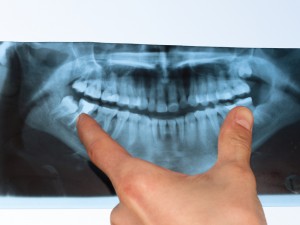 Wisdom teeth have grown quite a notorious reputation, not just for the discomfort they cause, but because of their seemingly complete irrelevance to the function of the mouth. You may have had your wisdom teeth removed before they caused you any trouble. If you are like most people, however, you’ve experienced the discomfort of third molars trying to force their way into the space at the back of your mouth. While you were cursing your wisdom teeth, and possibly calling them every name in the book (and some that aren’t), did you ever wonder what was the point of wisdom teeth in the first place? Dr. Michael Young takes a closer look at wisdom teeth and why they appear at all.
Wisdom teeth have grown quite a notorious reputation, not just for the discomfort they cause, but because of their seemingly complete irrelevance to the function of the mouth. You may have had your wisdom teeth removed before they caused you any trouble. If you are like most people, however, you’ve experienced the discomfort of third molars trying to force their way into the space at the back of your mouth. While you were cursing your wisdom teeth, and possibly calling them every name in the book (and some that aren’t), did you ever wonder what was the point of wisdom teeth in the first place? Dr. Michael Young takes a closer look at wisdom teeth and why they appear at all.
Why Do We Have Wisdom Teeth?
Our third molars, or wisdom teeth, are the last teeth to form and usually do not erupt (rise out of the gums) until the late teen years. Because of the discomfort and oral issues associated with these teeth, many people choose to extract them as soon as they appear, even if they have not caused trouble at that point. So why would we grow a set of teeth just to take them out as soon as they show up? Scientists believe the third molars did serve a purpose at one point. The diets of our early ancestors consisted of tougher, coarser food, such as raw plants and roots. Excessive chewing was needed to grind this food into something digestible, and constant tooth wear may have been a common problem. The extra molars provided the additional chewing power our ancestors required. These early humans are believed to have had wider jaws as well, so crowding due to third molar eruption must have been much less common than it is today. As we evolved and began cooking food to soften it, the third molars became unnecessary, and today evolutionary biologists consider wisdom teeth vestigial organs (no longer needed due to evolution).
Problems with Wisdom Teeth
Some people can fully develop their wisdom teeth and not experience any discomfort. The majority, however, experience all kinds of problems due to the growth of wisdom teeth. Because human jaws are smaller now, it is common for wisdom teeth to become impacted, or blocked, by surrounding teeth. Sometimes, the tooth may only partially erupt, and food particles can lodge in the gum tissue around the tooth, leading to gum infection and disease. If you are in or near the 70508 area and have a wisdom tooth you would like removed, call our office at (337) 237-6453 to schedule an appointment with your Lafayette dentist.

